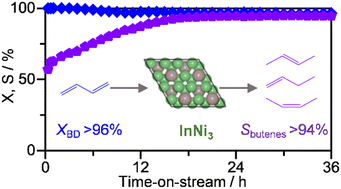InNi3C0.5@C-derived InNi3 alloy as a coke-resistant low-temperature catalyst for selective butadiene hydrogenation†
Abstract
The development of non-precious metal catalysts to replace Pd-based industrial catalysts for 1,3-butadiene hydrogenation is highly desired. However, the cheap transition metal-based candidates developed to date, including Ni, Cu, Co, and Fe, show lower activity than precious metal catalysts, and typically suffer from deactivation due to coke deposition. In this contribution, an InNi3 alloy catalyst is designed via depletion of the layers of a carbon-capped interstitial compound InNi3C0.5 by two different approaches, hydrogenation and air oxidation, under varying conditions. The carbon depletion processes are followed by combined techniques to determine the full structural and compositional evolution processes, and the resulting catalysts are thoroughly characterized and evaluated for the selective hydrogenation of 1,3-butadiene. The InNi3 alloy serves as a coke-resistant low-temperature catalyst for 1,3-butadiene hydrogenation, achieving >94% total butene selectivity at >96% conversion at a mild temperature of 318 K. Post characterization of the catalyst after long-term testing verifies the structural robustness and excludes the accumulation of carbonaceous deposits, thus confirming the InNi3 alloy as a novel and promising system for selective hydrogenations.



 Please wait while we load your content...
Please wait while we load your content...